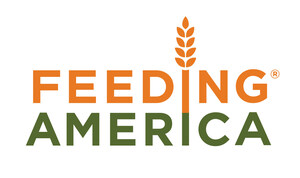Feeding America and 46 Organizations Send Letter to Congress, Urging Them to Save Federal Nutrition Programs from Devastating Cuts
CHICAGO, June 13, 2011 /PRNewswire-USNewswire/ -- Feeding America and 46 other partner hunger relief, faith-based and advocacy organizations sent a letter to Congress today strongly opposing proposed cuts to the federal nutrition safety net.
On Tuesday, Congress will vote on a bill that would eliminate federal food assistance for hundreds of thousands of our most vulnerable citizens – more than 130,000 seniors, and as many as 475,000 pregnant or nursing women, infants, and children.
Cuts to these federal nutrition programs would push more people to local charities for food assistance, many of which are barely able to keep up with current demand, let alone help even more people seeking help.
To make a terrible situation even worse, Congress is also proposing major cuts to programs that provide USDA commodities for distribution through church food pantries, soup kitchens and other local charities.
"If these proposed cuts are made to federal nutrition programs, not only will the charitable and faith community be unable to meet the increased demand for assistance, we will have to cut back on the amount of food and groceries we are now providing to our existing clients, people who are just barely able to survive from month to month. There will be less food available at the same time that more people are in need of help to feed themselves and their families," said Vicki Escarra, president and CEO of Feeding America.
While we agree that Congress and the President need to make tough choices to get our nation's fiscal house in order, deficit reduction should not come at the expense of the most vulnerable among us, especially low income children and seniors for whom daily life is already a struggle.
The text of the letter and list of endorsing organizations follows:
U.S. House of Representatives
Washington, DC 20515
June 13, 2011
Dear Representative:
We write to express our strong opposition to the severe cuts to nutrition programs in the FY2012 Agriculture Appropriations bill, passed by the House Appropriations Committee on May 31. This legislation would have a devastating impact on our most vulnerable citizens and erode the foundation of the emergency food network. We urge you to vote no when this bill comes to the House floor for a vote unless funds are restored to fully fund caseload for food assistance programs.
Proposed cuts to the Special Supplemental Nutrition Program for Women, Infants and Children (WIC) and the Commodity Supplemental Food Program (CSFP) would result in hundreds of thousands of low-income women, infants, children, and seniors losing needed nutrition assistance. Those cuts would push more people to local charities for food assistance at the same time that the legislation reduces support for emergency food providers like food banks, faith-based pantries, and other local agencies. The more than 20 percent cut to both commodity support and administrative funding that flows to local charities through the Emergency Food Assistance Program (TEFAP) would force communities to cut back services or turn away clients at a time when demand for food assistance remains at unprecedented levels.
The need for food assistance increased dramatically during the prolonged and severe recession. The most recent USDA data shows that the number of food insecure households increased 33 percent from 2007 to 2009, and according to Feeding America, the number of clients being served by the emergency food system increased 46 percent since 2006, before the recession began. Millions of workers have lost their jobs, and many of those who have been able to find new employment still need assistance feeding their families because they lack the same earning power as before the recession. With unemployment still hovering around 9 percent nationally, need is expected to remain high throughout 2012.
Meeting the need for food assistance is especially critical for our most vulnerable citizens – pregnant and nursing women, infants, children, and seniors for whom the consequences of hunger and poor nutrition are more severe. And because struggling families often turn to local charities as the first line of assistance when they fall on hard times, it is critical that we maintain support for the emergency food system.
As such, we urge the House to reject the proposed cuts to nutrition assistance in the FY2012 Agriculture Appropriations bill and instead adopt the following recommendations:
Special Supplemental Nutrition Program for Women, Infants and Children (WIC): WIC provides a nutritious monthly food package to 8.9 million low-income pregnant and nursing women, infants and young children at nutritional risk. The FY2012 Agriculture Appropriations bill approved by the full committee would fund WIC at $6.048 billion, a reduction of $686 million from current funding levels. This would cause between 200,000 and 350,000 low-income mothers and young children to be cut from the program, depending on the rate of food inflation. Administrations and Congresses of both parties over the last 15 years have provided enough funding to serve all eligible women, infants and children who apply. The proposed cut would break that 15-year bipartisan commitment.
- We urge Congress to fund WIC at $6.83 billion and continue to closely monitor WIC caseload and food cost inflation to assure sufficient funding to maintain current caseload, keep pace with rising food prices, and ensure WIC is able to serve all eligible mothers and young children who apply to the program.
Commodity Supplemental Food Program (CSFP): CSFP is a commodity program that leverages government buying power to provide nutritious food packages to approximately 604,000 low income people each month, 96 percent of whom are seniors with incomes of less than 130 percent of the Federal Poverty Line (approximately $14,000 for a senior living alone). The $20 cost to USDA of providing commodities results in a monthly food package with an average retail value of $50, meaning that the CSFP food package not only provides valuable nutrition to our most vulnerable seniors but a valuable return on investment for the federal government. The House FY2012 Agriculture Appropriations bill would fund CSFP at $138.5 million, which represents a 22 percent cut from current funding levels and would result in loss of food for at least 130,000 low income seniors.
- We strongly urge you to provide $181.8 million for CSFP to maintain current caseloads and allow CSFP to expand into six additional states with USDA approved state plans (Connecticut, Hawaii, Idaho, Maryland, Massachusetts and Rhode Island).
The Emergency Food Assistance Program (TEFAP): TEFAP is a means-tested federal program that provides healthy and nutritious food commodities at no cost to low-income Americans in need of short-term hunger relief. TEFAP commodities are distributed through organizations like food banks; faith-based pantries at local churches, synagogues, and mosques; soup kitchens; and emergency shelters. The House FY2012 Agriculture Appropriations bill would cap mandatory funding for TEFAP commodities at $200 million, a cut of $51 million, and would make a 23 percent cut to TEFAP administrative funding used to support storage and distribution of commodities. These cuts would come at a time when the emergency food system is already facing a projected 50 percent reduction in USDA bonus commodities, down by over $300 million in FY2011. The proposed reductions in TEFAP will force many local agencies to reduce support for existing clients or turn away new clients at a time when demand for emergency food assistance remains at unprecedented levels.
- Congress must reject the cap on mandatory TEFAP commodities and fully fund TEFAP administrative funds at the $100 million authorized level.
Supplemental Nutrition Assistance Program (SNAP): SNAP is the cornerstone of the federal nutrition safety net, responding quickly to meet increased need during the recession. The House FY2012 Agriculture Appropriations bill would provide a $3 billion reserve, $2 billion less than the administration requested. With ongoing need in the midst of a slow recovery and continuing high unemployment, SNAP must have adequate reserves to be able to respond quickly to any unexpected increase in demand resulting from the economy or a natural disaster.
- We recommend that SNAP be funded to adequately meet need, including by setting the SNAP reserve fund at $5 billion to protect against any shortfall in serving those eligible.
As you work to address the serious fiscal challenges facing our nation, we urge you to reject proposed cuts to the nutrition safety net and instead work to safeguard the essential food and nutrition programs which protect millions of struggling families from hunger and improve nutrition among our most vulnerable citizens.
Sincerely,
9to5, National Association of Working Women
Alliance to End Hunger
American Association of University Women
American Commodity Distribution Association
American Dietetic Association
B'nai B'rith International
Bread for the World
Campaign for America's Future
Center for Law and Social Policy
Church of the Brethren, Global Partnerships
Coalition on Human Needs
Community Food Security Coalition
End Hunger Network
The Episcopal Church
Feeding America
First Focus Campaign for Children
Food Research and Action Center
Half in Ten Campaign
Jewish Council for Public Affairs
LeadingAge
Meals on Wheels Association of America
Mennonite Central Committee U.S. Washington Office
National Academy of Elder Law Attorneys
National Advocacy Center of the Sisters of the Good Shepherd
National Association for the Edu+cation of Young Children
National Association of Nutrition and Aging Services Programs
National Committee to Preserve Social Security and Medicare
National Commodity Supplemental Food Program Association
National Council of Jewish Women
National Council of La Raza
National Council on Aging
National Law Center on Homelessness & Poverty
National WIC Association
OWL – The Voice of Midlife and Older Women
Presbyterian Church (U.S.A.) Office of Public Witness
Racial and Ethnic Health Disparities Coalition
RESULTS
School Nutrition Association
Share Our Strength
Sisters of Mercy Institute Justice Team
Union for Reform Judaism
The United Church of Christ, Justice and Witness Ministries
The United Methodist Church – General Board of Church and Society
Voices for America's Children
WhyHunger
Wider Opportunities for Women
Women of Color Policy Network, NYU Wagner
Contact:
Ross Fraser
312-641-6422
SOURCE Feeding America
WANT YOUR COMPANY'S NEWS FEATURED ON PRNEWSWIRE.COM?
Newsrooms &
Influencers
Digital Media
Outlets
Journalists
Opted In





Share this article